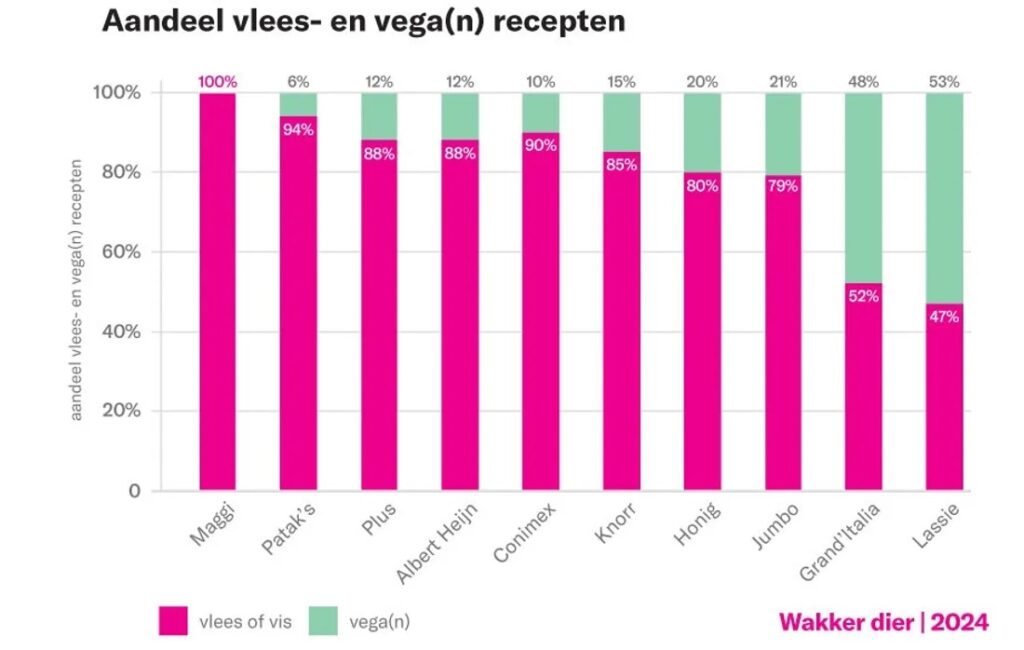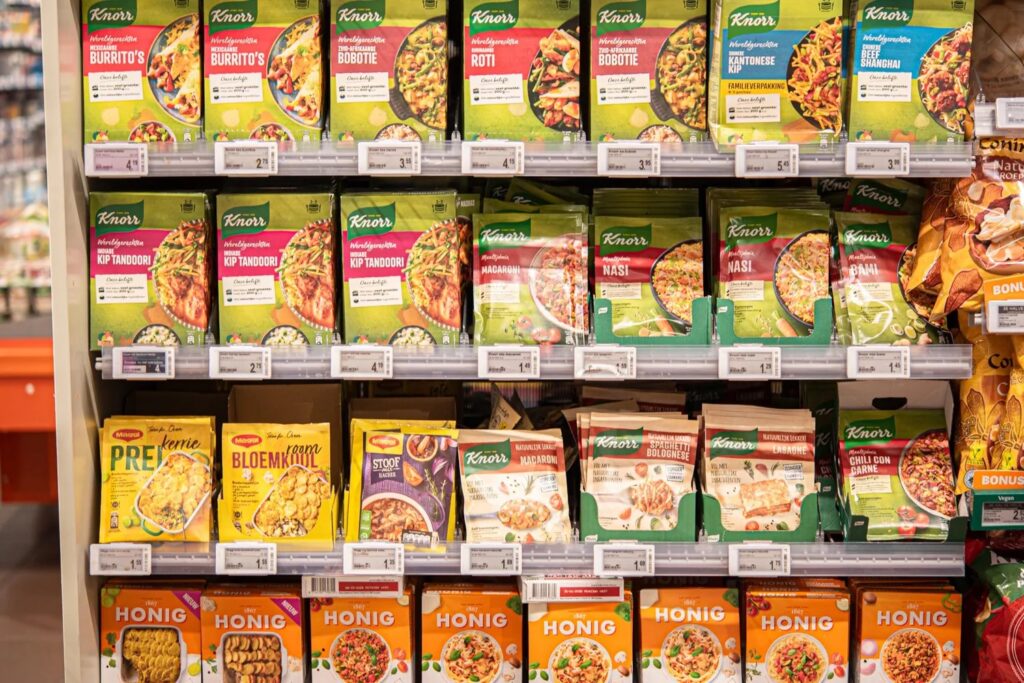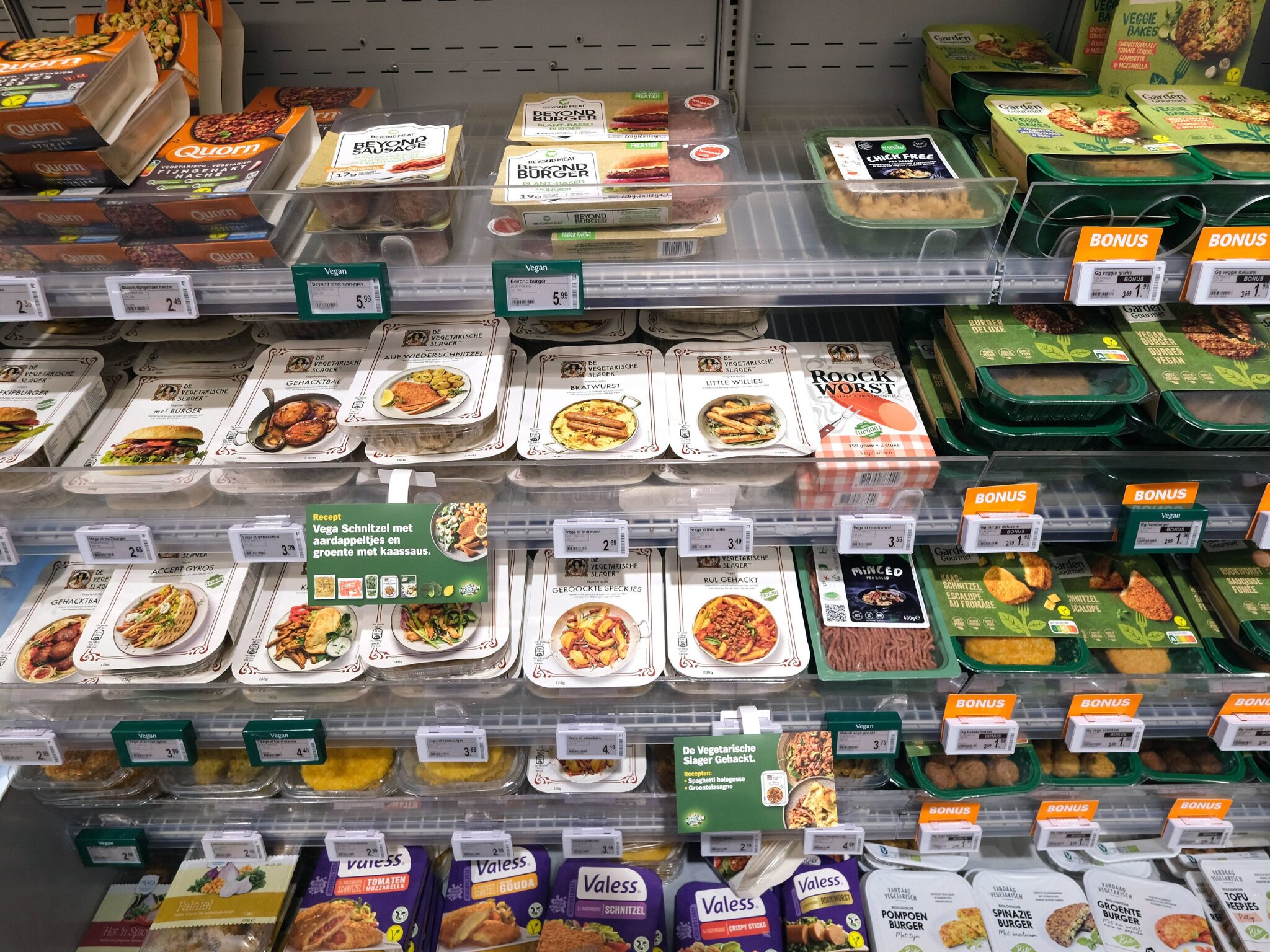Dutch Brands Agree to Make Half of the Recipes on Food Packaging Meatless
4 Mins Read
In response to campaigning by Dutch animal rights group Wakker Dier, seven brands have agreed to make at least 50% of the recipes on food packaging vegan or vegetarian.
Seven CPG brands have agreed to increase plant-based and vegetarian visibility on-pack in the Netherlands, accepting animal advocacy group Wakker Dier’s request to make at least half of the recipes on product packaging meatless.
Conimex, Fairtrade Original, Jumbo, Knorr, Koh Tai, Patak’s and Plus will all make the adjustment, while Grand’Italia (with 48% of on-pack recipes free from meat and fish) and Lassie (53%) already do so.
“These brands inspire consumers and show that you don’t have to cook meat the old-fashioned way every day,” Collin Molenaar, campaigner at Wakker Dier, said. “Packages are ideally intended to inspire consumers with simple dishes. And so they can also help people to choose plant-based more often.”
Meanwhile, Albert Heijn and Maggi have plans to add plant-based tips to recipes, but haven’t said they’ll remove meat from half of them. And according to Wakker Dier, Honig (80% of whose packaging recipes are not suitable for vegetarians) is the only brand that hasn’t promised a shift.
On-pack recipes drive meat overconsumption

Currently, over 80% of all recipes on packaging and bags recommend meat or fish, according to an analysis of 657 recipes on product packaging by Wakker Dier. In fact, none of Maggi’s recipes are vegetarian, while only 6% of Patak’s recipes don’t feature meat or seafood. In fact, apart from Grand’Italia and Lassie, only Jumbo has more than 20% of recipes that are suitable for meat-free consumers, and even this is by a small margin (21%).
Given that many consumers follow back-of-the-box recipes, this encourages the overconsumption of meat. In fact, 29% of the recipes with red meat contain a larger amount than what’s recommended by the national dietary guidelines. Wakker Dier notes how the Health Council of the Netherlands recommends eating a diet where 60% of a person’s protein consumption comes from plant-based sources.
The Dutch eat 1.8 million kgs of meat every day, which makes up 60% of their diet. And, while last year 49% of consumers in the country reported reducing their meat consumption from the year before, government data revealed that only 5.5% are vegetarian or vegan. But on the flip side, as of last June, retail sales of meat had fallen for nine consecutive quarters in the Netherlands, down by 13% from 2019.
Plus, analysis in 2022 from the Good Food Institute revealed that the Netherlands is the sixth-largest market in terms of plant-based sales, but its residents have the highest per capita consumption rates of plant-based foods.
Wakker Dier’s 60-40 plant-based campaign

One of Wakker Dier’s campaign goals is to have at least 60% of the proteins sold by food vendors in the country be plant-based by 2030, and ensure that the total amount of protein sold won’t increase. This target has been embraced by nine supermarkets and 16 caterers, including Albert Heijn, Lidl, Aldi, Jumbo, Compass Group, Van Leeuwen Catering and Albron.
These companies have pledged towards 50% plant-based proteins by 2025 – and 60% by the end of the decade – agreeing to monitor and publicly report their sales’ plant-animal ratio. “These caterers together make a huge impact for the animals,” Molenaar said in December. “If people experience how tasty and easy it is to eat fewer animals, they can also continue that good habit at home.”
Currently, Aldi has the lowest share of meat alternatives (12%), while Albert Heijn has the highest (36%). The latter ranks second in terms of physical shelf space for plant-based products, which make up 24% of its area, behind only Jumbo (25%). In fact, Jumbo made headlines earlier this month after announcing it will cease all meat promotions in its stores from May, following intense criticism by animal rights groups, including Wakker Dier.
Now, its campaign has effected another change, with Fairtrade Original, Jumbo, Knorr, Koh Tai, Patak’s and Plus all promising to introduce an even split between meat and meatless in on-pack recipes by 2025, and Conimex saying it will do so by 2026.
In other alternative protein news, the Dutch government recently became the first EU nation to develop a framework to allow public tasting events of cultivated meat. Speaking at an EU Agrifish Council meeting, its food quality and agriculture minister Piet Adema said: “We believe that it is important to support innovations that create production methods for animal proteins complementary to, and not as a substitute to, conventional sustainable production.”



